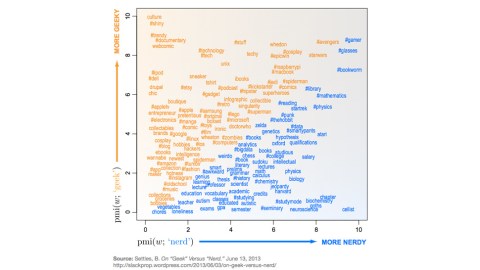Are You a Geek or a Nerd? The Difference Really Is in the Data

The words “nerd” and “geek” are often used interchangeably, as if they mean the same thing. They actually don’t:
- geek – An enthusiast of a particular topic or field. Geeks are “collection” oriented, gathering facts and mementos related to their subject of interest. They are obsessed with the newest, coolest, trendiest things that their subject has to offer.
- nerd -A studious intellectual, although again of a particular topic or field. Nerds are “achievement” oriented, and focus their efforts on acquiring knowledge and skill over trivia and memorabilia.
Or, as Slackpropagation puts it, “Both are dedicated to their subjects, and sometimes socially awkward. The distinction is that geeks are fans of their subjects, and nerds are practitioners of them.” In order to clarify those differences, he made this map. You can click here for a larger image of it.
Using that distinction, he pored over 2.6 million Tweets using both the streaming and search APIs for over a one month period. After crunching the numbers to figure out each word’s PMI (pointwise mutual information), he got a pretty good predictor of the semantic word similarities between “geek” and “nerd.” There were more than he expected, as you can see from the map.
Orange words are geeky. Blue ones are nerdy. The words on the vertical axis become more geeky as you go up, and the words on the horizontal axis become more nerdy as you move right. Slackpropagation continues: “Words along the diagonal are similarly geeky and nerdy, including social (“#awkward”, “weirdo”), mainstream tech (“#computers”, “#microsoft”), and sci-fi/fantasy terms (“doctorwho,” “#thehobbit”).” Other observations from the data include:
- Collections are geeky: All derivatives of the word “collect” (“collection,” “collectables”, etc.) are orange. As are “boxset” and “#original,” which imply a taste for completeness and authenticity.
- Academic fields are nerdy: “math”, “#history,” “physics,” “biology,” “neuroscience,” “biochemistry,” etc. Other academic words (“thesis”, “#studymode”) and institutions (“harvard”, “oxford”) are also blue.
- The science & technology words differ: General terms (“#computers,” “#bigdata”) are on the diagonal — similarly geeky and nerdy. As you splay up toward more geeky, though, you see products, startups, brands, and more cultish technologies (“#apple”, “#linux”). As you splay down toward more nerdy you see more methodologies (“calculus”).
- Hobbies: compare the more geeky pastimes (“#toys,” “#manga”) with the more nerdy ones (“chess,” “sudoku”).
- Brains: the word “intelligence” may be geeky, but “education,” “intellectual,” and “#smartypants” are nerdy.
- Reading: “#books” are nerdy, but “ebooks” and “ibooks” are geeky.
- Pop culture vs. high culture: “#shiny” and “#trendy” are super-geeky, but (curiously) “cellist” is the nerdiest…
All observations quoted from Slackpropagation.
If the map isn’t helpful to you, or you’d like another perspective, check out this infographic from Diego Martinez-Moncada at Daily Infographic. The dataset is different from Slackpropagation’s, but it comes from the same 2012 time period – and draws the same conclusions:

So now that you have all that, where do you stand?





